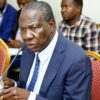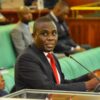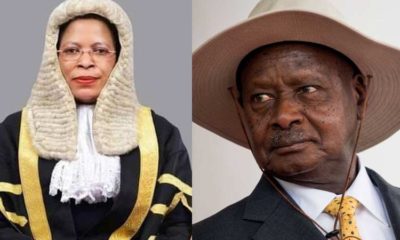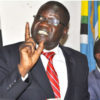Analysis
Experts denounce 2019/20 budget proposals, call them exclusive

Dr Ezra Suruma former Finance minister has no kind words for government
Kyadondo East Member of Parliament Robert Kyagulanyi a.k.a Bobi Wine may be in and out of jail but his campaign to rally Ugandans to reject the government of President Yoweri Museveni is receiving growing support including from among the elites.
Academicians, the elite business community and members of the civil society united in condemning the ongoing budget process as little more than an exercise to entrench and perpetuate the minority ‘eating class’ as opposed to delivering meaningful services that are needed to transform the lives of ordinary people.
The voices of dissent came during a pre-budget discussion that was organised by Mekerere University Business School (MUBS) with support from Friedrich-Ebert-Stiftung under the theme: “Budgeting for Economic Transformation and Social Inclusion.”
One of the outstanding criticisms of the coming 2019/20 budget focused on the way those in government have decided to mortgage the earnings of future generations by borrowing excessively.
Pleas from the Director of the Budget Kenneth Mugambe that Uganda’s debt is still sustainable, were not able to convince participants who cited the rising rate at which the government is contracting loans as a road to abyss.
Dr. Fred Muhumuza, a renowned economist from Makerere University noted that Uganda’s debt repayments are more than 56% of its revenues. Muhumuza therefore urged the government to abandon the yardsticks of the lenders, because, he argued, the lenders are in business. Ministry of Finance officials continue to insist that Uganda’s debt is still sustainable because it is below the 50% mark of the country’s GDP.
But Muhumuza dismisses the government’s logic, saying: “You cannot be paying UGX12 trillion out of the UGX18 trillion that URA collects and still think your debt is sustainable,” Muhumuza explained that the total stock of debt that due for repayment ranges between UGX10-12 trillion. He added that interest alone on the debt that is due goes up to UGX3.5 trillion, but that the government has at times failed to meet its obligations and rolled over the debt to the following year.
Many participants concurred that the very little if any of the borrowed money is going into projects that seek to lift the lives of ordinary people. Citing the US$200m (UGX750bn) that was borrowed from Standard Chartered Bank to purchase security cameras, which wasn’t even budgeted for, Muhumuza said the security spending will damage economic prospects of the economy.
Muhumuza said: “Increased spending on security means the government will spend less on the productive sectors of the economy such as agriculture, energy and water. We may not be at war, but the things are not normal the way the government wants is to believe. Economic trends are going to change whether we like it or not.”
Other participants cited the recent request by the ministry of finance to guarantee a US$360m loan for an Italian investor, as a shadowy project meant to syphon public resources.
The elite hospital is scheduled to be built at Lubowa on Entebbe road, but the way it was parachuted to the top of the priority list, left many in shock, especially considering that a mere UGX38bn that Mulago’s renovation needs is not available.
Former minister of Economic Monitoring in Museveni’s government Henry Banyenzaki slammed the Ministry of Finance for being corrupt by accepting loan requests from departments in exchange for kickbacks.
Profligate spending
Buliisa county Member of Parliament Mukitare Birahwa, on the other hand, criticised the government’s lack of willingness to build the capacity of Ugandans to take charge of the economy by denying them opportunities. He cited the government’s continued sourcing of furniture, paper and other services from foreign countries instead of ring-fencing the tenders for Ugandans, as a contradictory stance against its own Buy Uganda Build Uganda (BUBU) policy.
Mukitare and many others condemned the government’s failure to fix the three sectors of health, education and public transport, as indicators that the government is not budgeting for transformation and inclusive growth.
Mukitare challenged the government to stop buying expensive cars for its officials but instead adequately capitalize Uganda Development Cooperation (UDC) to invest into a public transport company as a way to reduce the jam.
Dr Ezra Suruma, the former Minister of Finance now working as the head of the government’s service delivery monitoring unit in the Office of the Prime Minister, didn’t have kind words for the government either.
Suruma criticised the government for failing to grow its own banks which he said would empower people and businesses to create jobs.
He said: “The legitimacy of the budget requires satisfaction of the citizens. That is why the Parliament, as the representatives of the people, is always asked to pass it.
In Uganda’s case unemployment is actually the most important macroeconomic challenge even though the budget is still silent about it. If citizens don’t have income, are we having an inclusive or transformative budget?” Suruma wondered.
He said his earlier efforts to budget for the ordinary people by focusing on the rural economy, was frustrated by the government.
He recollected his earlier efforts, while he was Minister of Finance, to encourage the government to grow indigenous banks that can finance local projects, has left most people jobless because they don’t have capital.
The former minister sharpened his criticism by stating that even if there are no banks to lend to people, farmers should at least be given opportunity to access water to irrigate their crops and fertilizers, as the basic minimum effort by the government to ensure that people have some income.
Agnes Kirabo, the Executive Director of the Food Rights Alliance, was more uncompromising when she called on Ugandans to find ways of getting rid of the government. Using figurative speech, Kirabo repeatedly noted that Ugandans need to unite to push the elephant out of the room.
Comments



























